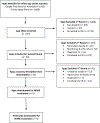A Structured Review of Commercially Available Cardiac Rehabilitation mHealth Applications Using the Mobile Application Rating Scale
- PMID: 35135963
- PMCID: PMC11086945
- DOI: 10.1097/HCR.0000000000000667
A Structured Review of Commercially Available Cardiac Rehabilitation mHealth Applications Using the Mobile Application Rating Scale
Abstract
Purpose: This study systematically evaluated the quality and functionalities of patient-facing, commercially available mobile health (mHealth) apps for cardiac rehabilitation (CR).
Methods: We performed our search in two of the most widely used commercial mobile app stores: Apple iTunes Appstore and Google Play Store (Android apps). Six search terms were used to query relevant CR apps: "cardiac rehabilitation," "heart disease and remote therapy," "heart failure exercise," "heart therapy and cardiac recovery," "cardiac recovery," and "heart therapy." App quality was evaluated using the Mobile Application Rating Scale (MARS). App functionality was evaluated using the IQVIA functionality scale, and app content was evaluated against the American Heart Association guidelines for CR. Apps meeting our inclusion criteria were downloaded and evaluated by two to three reviewers, and interclass correlations between reviewers were calculated.
Results: We reviewed 3121 apps and nine apps met our inclusion criteria. On average, the apps scored a 3.0 on the MARS (5-point Likert scale) for overall quality. The two top-ranking mHealth apps for CR for all three quality, functionality, and consistency with evidence-based guidelines were My Cardiac Coach and Love My Heart for Women, both of which scored ≥4.0 for behavior change.
Conclusion: Overall, the quality and functionality of free apps for mobile CR was high, with two apps performing the best across all three quality categories. High-quality CR apps are available that can expand access to CR for patients with cardiovascular disease.
Copyright © 2022 Wolters Kluwer Health, Inc. All rights reserved.
Conflict of interest statement
The authors declare no conflicts of interest.
Figures



References
-
- Heart Disease Facts | cdc.gov. https://www.cdc.gov/heartdisease/facts.htm.
-
- Leon AS et al. Cardiac rehabilitation and secondary prevention of coronary heart disease: an American Heart Association scientific statement from the Council on Clinical Cardiology (Subcommittee on Exercise, Cardiac Rehabilitation, and Prevention) and the Council on Nutrition, Physical Activity, and Metabolism (Subcommittee on Physical Activity), in collaboration with the American association of Cardiovascular and Pulmonary Rehabilitation. Circulation 2005;111, 369–376. - PubMed
-
- Suaya JA, Stason WB, Ades PA, Normand S-LT & Shepard DS Cardiac rehabilitation and survival in older coronary patients. J. Am. Coll. Cardiol. 2009;54, 25–33. - PubMed
-
- Cano de la Cuerda R, Alguacil Diego IM, Alonso Martín JJ, Molero Sánchez A. & Miangolarra Page JC Cardiac rehabilitation programs and health-related quality of life. State of the art. Rev Esp Cardiol (Engl Ed) 2012;65, 72–79. - PubMed
-
- Anderson L. et al. Exercise-Based Cardiac Rehabilitation for Coronary Heart Disease: Cochrane Systematic Review and Meta-Analysis. J. Am. Coll. Cardiol. 2016;67, 1–12 (2016). - PubMed
MeSH terms
Grants and funding
LinkOut - more resources
Full Text Sources
Medical
Miscellaneous

